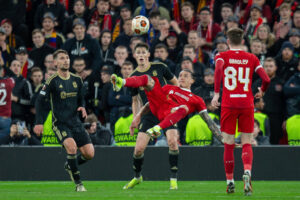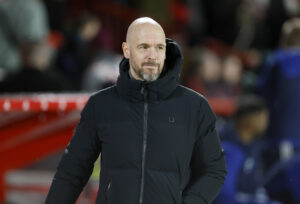As a 14-year-old, London schoolboy John Terry was signed by Chelsea into their youth academy. 23 years later and he has retired as one of the most decorated players of all time. He has 18 major trophies to his name and was nominated for numerous individual honours. Terry will be considered as one of the best centre-backs of his generation, maybe of all time. His dedication to Chelsea will see him go down as the clubs best ever captain. He is irreplaceable.
John Terry: Captain, Leader, Legend
Youth Years
Terry was from an era of players still brought up in the traditional academy system. Players would earn very little money; the generosity of senior players was sometimes the only form of income. Cleaning boots and not speaking unless spoken to were all common in Terry’s early life at Cobham. It would be an honour for a prestigious player like Ruud Guillet to ask for his Adidas Copas to be cleaned and depending on the player, it wasn’t unheard of to have this at no reward. There was no lazing around as a younger player in Terry’s time. No relaxing and no taking liberties. They were there to win. To become footballers. Terry kept this attitude throughout his career, making him a role model for all those attempting to become the next John Terry and progress into Chelsea’s first team.
Breakthrough
Terry’s Chelsea debut came in December 2001 against Charlton in a season where he managed 23 first team appearances. Breaking into a team dominated by superstar players and foreign power was no mean feat. He gave the manager something to think about and formed a solid partnership at the heart of the defence. It became hard to imagine the Blues without their rock at the back.
There was something about Terry, even at an early age. He was a born leader. It was a token of responsibility and trust from Claudio Ranieri to give him the captain’s armband at 21. He took the role from Marcel Desailly, an international and world-class centre-back, involved in a French team that would go on to win the Euros. That is how good Terry was.
The Mourinho Effect
If you were to ask John Terry who the most influential character on his career was, the answer would almost certainly Jose Mourinho. The Englishman has been quoted as saying that Mourinho was his best coach and has nothing but admiration for his style. The two went hand in hand with their knack for winning, leadership and need for solidity in defence. Mourinho needed someone to transfer across his mentality and he found his man from the very get-go.
Handed the captaincy on a permanent basis for the 2004/05 season, Terry and Mourinho’s Chelsea bulldozed through the Premier League. Breaking records for least goals conceded, most clean sheets in a row and Terry also helped goalkeeper Petr Cech get the record for longest time without conceding. This was perfection for the manager. His team were epitomised by their captain. He was a role model. A player that would take his team out to battle with the badge worn proudly on his chest. The club came first. Representing Chelsea meant everything to Terry.
The Perfect Pair
Mourinho was rigorous in his methods, leaving nothing to chance. He drilled that team, almost Graham Taylor like. Mourinho’s back five and holding midfielders were the most consistent unit the league has ever seen. They looked as though they lived their lives together, ate together, went home together. It was all in sync. The movements and positioning of everyone was pinpoint.
Without Terry as captain, Mourinho couldn’t have created this force. Terry was the line between management and players. But his captaincy wasn’t all that made him such a good player. His defending was exquisite. Named as Premier League player of the year, John Terry was also voted into the UEFA Team of the Year and FIFpro XI. He was an unbelievable performer who knew where to be and when.
Drive to Win
Natural ability is one thing, attitude is another, especially in young players. So often we see them not making it to the height of their potential due to media attention. It comes with the celebrity life and complacency in the life of a modern-day footballer. Terry had none of this. He was a driven winner, not content with anything. At the end of the day, he wanted to lift a trophy and was prepared to go to all extents to do it.
He put his body on the line in the League Cup final of 2007 against Arsenal, diving low to head a ball clear in his six-yard box only to be knocked unconscious. Chelsea won that day (thanks to a Didier Drogba double at the Millenium stadium in Cardiff). Terry had scares. He had a mask. He also had another trophy to his name, a medal around his neck. In his eyes, these would last a lot longer than the physical pain.
Trophy Cabinet Fit For a King
Chelsea have not yet won a Premier League title when John Terry hasn’t been at the club, even under Antonio Conte when he wasn’t heavily involved in the team’s success in 2016/17. There aren’t many people in sport that would so happily sit back and watch their team win. He was grounded and realised where he was at in his career. With no dispute over game time, John Terry acted as an extra coach; even with decreasing minutes, he was no less help on the training pitches. An example of the great man he is.
After winning a league trophy many players rest on their success and motivation decreases. Terry was not one of these. Success made him hungry for more and his efforts were always rewarded. He won a trophy in nine of his 13 seasons as captain, not to mention back-to-back titles between 2004 and 2006, a double in 2010 under Carlo Ancelotti and another with Mourinho in 2015. His collection of honours is a sight to behold, winning more in a single career than most clubs can boast in their history. John Terry could lift trophies in his sleep.
Longevity and Loyalty
Being at a club for 22 years and not becoming bored or being swayed by more money or larger teams is something we don’t see very often in the modern game. Maybe Terry represents the last coming of a group of players that hold a deeper love for their first club. Having only spent one brief season on loan at the City Ground (where Nottingham Forest and several other clubs fought for his signature on a permanent basis), Terry spent all of his prime years in the Premier League for Chelsea. He did, though, have one year at Aston Villa, which could have been two had they been promoted, at the end of his career. This longevity in football is almost unheard of.
Not only does he need incredible fitness to perform for this long, but he needs the mental strength to keep playing. Also, adapting to new clubs, managers and teams is proof of the professional he has been and continues to be. To perform late into your thirties and continue to want to develop as a player and coach is a credit to the man.
Tired Legs and Conte’s Man Management
Even in his later years at Chelsea, Terry defied many doubters, especially the 2014/15 title-winning campaign under Mourinho’s management. Terry had been doubted as being too old, too slow and not cut out for the league’s pace and technical level. Terry lifted the trophy that year, the fourth time in his career, part of a Chelsea team that perfectly combined attacking flare and defensive stability. They were the most balanced team in Europe and Terry’s performance at centre-back with Gary Cahill saw them both nominated into the PFA Team of the Year.
His performances were summed up by a stellar game away at the Emirates, a match that would see Chelsea be just two wins away from winning the league. A 0-0 draw was greeted with cries of ‘boring, boring Chelsea’ from the travelling fans, not out of disgust but admiration. Terry had captained the team to a massive point, perfectly playing the situation and getting the job done in typical Mourinho style. A week later away at Leicester, Terry got the goal to give Chelsea a 2-1 lead and they wrapped up the title the next weekend.
Even at 34-years-old, Terry managed to play every minute of the domestic league, arguably his best season in terms of individual performance.
Goal-Scoring Prowess
For all of Terry’s defensive attributes, he got his fair share of goals, managing to become the highest scoring defender in Premier League history. Most famous is his goal at home against Barcelona in the Champions League during the 2004 season. He also scored the goal against Napoli at Stamford Bridge to level their Champions League last 16 game in 2012 and scored Chelsea’s only goal in an effective title decider against Manchester United in 2010. A big player in the big moments.
Terry overtook David Unsworth as the top-scoring defender in the Premier League, ending on 41 goals. Having not taken any penalties in the league, it shows his dominance in the air and his threat from any set piece. His presence in the box is something that also saw him score six times for his country and 67 times overall for Chelsea.
Media Attention
Although Terry has been a thorough professional throughout his career, he hasn’t gone under the attention of the media. In 2010 his alleged affair with Wayne Bridge’s partner was in all the newspapers and resultantly his form dropped for Chelsea.
Terry also retired from international football after the racism scandal from 2012 involving Anton Ferdinand. Terry had been caught saying something to Ferdinand before it was written off by both players after the game. Subsequently, a lip reader translated what Terry said and he went to court and was investigated for racist behaviour.
Even with his encounters with the media and also competitive rivalry with opposing fans during the course of his career, Terry will not be remembered for this. His trophy cabinet speaks for itself and, after playing for 24 years, it is hard to not have conflicting run-ins along the way. World class players draw attention to themselves and as a result, they prove people wrong on the pitch.
How to Replace John Terry
Over the coming decades, many managers will try to replace him. Steve Bruce was unable to fill the void left by his departure at Villa this season and he has since been sacked – a void filled by Brentford’s Dean Smith with Terry himself as Smith’s assistant. Chelsea no longer have any of their ‘old guard’ at the club and haven’t been able to find someone capable of his leadership, ability, mentality or longevity.
The relationships formed between long-serving players are always so important and in Terry’s career, he has had a few constant characters around him. Frank Lampard and Petr Cech along with Didier Drogba have followed Terry during his career, decreasing the workload on someone so immensely busy. It is through these bonds as well that clubs are formed, foundations are made and eras are created. Losing these players over the space of three or four years can be detrimental.
As for the youth of Chelsea, they continue to, year-in-year-out, produce fantastic prospects that have the potential to go to the top of the game. But these players are lost. It is perhaps no coincidence that Terry’s name is being brought up again regarding the Cobham set up now his career is over. After all, his experience and expertise could unlock one or a few of these players to go to the next level.
If you combine what Terry has achieved and also his knowledge of the club, including what Gianfranco Zola knows about Terry from his years in London, there is a man that Maurizio Sarri could be brought to trust. If this happens and he is to have a role at Chelsea, the chances of another John Terry will be increased.
JT
John Terry is Chelsea Football Club and Chelsea Football Club is everything to John Terry, he knows the club inside out. John Terry bleeds blue blood.
Thank you, John Terry.
Captain. Leader. Legend.
Main Photo






